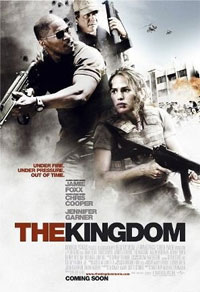 The Kingdom opens with a striking historical montage, depicting the roots of Saudi Arabia and why this country means so much to the U.S. We’re soon plunged into a horrific attack, viewing the killing of whole American families and the Saudi police who guard them in compounds where Islamic law does not apply. It’s not long before Jamie Foxx and his intrepid FBI colleagues are secretly flying to the kingdom to show the Saudi police how to solve crimes.
The Kingdom opens with a striking historical montage, depicting the roots of Saudi Arabia and why this country means so much to the U.S. We’re soon plunged into a horrific attack, viewing the killing of whole American families and the Saudi police who guard them in compounds where Islamic law does not apply. It’s not long before Jamie Foxx and his intrepid FBI colleagues are secretly flying to the kingdom to show the Saudi police how to solve crimes.
The film constructs all the clichés of cops traveling to foreign lands – there’s a local officer who our own hero at first dislikes, then grows to love, then is killed in a hail of bullets; the token “good Muslim” gets to die a martyr to the cause of keeping Foxx and the rest of us safe; while Jennifer Garner seeks to undo the trauma of violence by offering a lollipop to a child who has just witnessed their rampage. The local State Department official is ineffectual, committed only to keeping the FBI from doing anything that would annoy the Saudi hierarchy.
This film wants to be a serious exploration of U.S.-Middle East relations, and in its portrayal of Saudi street life it manages to be more accurate than many. But ultimately, The Kingdom is in love with violence. The modus operandi of the FBI characters is to look for evidence and then shoot the guilty. It’s mob rule, more akin to Wild West stereotypes than even the most right-wing interpretation of due process. Near the beginning of the film, one character tells a grieving friend of one of those killed in the attack, “we’re going to kill them all.” The friend is relieved and stops crying. The film’s implication is that so should we.
Having lived through the civil conflict in northern Ireland, I know closely what it means for people to kill each other over politics, ethnicity, and religion – for nearly 40 years. We have finally brought the violent part of the conflict to an end, not because one party achieved victory over another, but because we agreed to share political power. Some of the very people who supported the killing are now holding office in a devolved local government administration. Former sworn enemies are now responsible for such things as agriculture policy, education, and property tax rates.
Our “peace” was not won through sentimentality, nor did it come by repaying violence with violence. Peace processes are not often about traditional notions of justice – indeed peace processes often necessitate that injustices be done. For example, the release of prisoners who only a few years earlier had ripped out people’s teeth or smashed open their skulls is a very painful thing for their victims to observe. But in transitional societies, it may be the only thing that allows everyone to have a new start, whether they deserve it or not.
It should go without saying that “we’re going to kill them all,” or dealing with guilty people simply by shooting them, does not make it easy for the contrition necessary for reconciliation to happen. It unequivocally does not reduce the tensions that produce only more violence.
The story we tell ourselves about justice in large part determines what we will stomach in the real world. In this regard, perhaps The Kingdom knows more than I want to give it credit for. A film that ends with both the American hero and the future leaders of Islamic militancy swearing, “We’re going to kill them all,” doesn’t just understand the human tendency to seek violent revenge, but prophesies what planet earth will look like if we don’t rethink our approaches to violence, justice, and how to have security without destroying our neighbors.
 Gareth Higgins is a Christian writer and activist in Belfast, Northern Ireland. For the past decade he was the founder/director of the zero28 project, an initiative addressing questions of peace, justice, and culture. He is the author of the insightful How Movies Helped Save My Soul and blogs at www.godisnotelsewhere.blogspot.com
Gareth Higgins is a Christian writer and activist in Belfast, Northern Ireland. For the past decade he was the founder/director of the zero28 project, an initiative addressing questions of peace, justice, and culture. He is the author of the insightful How Movies Helped Save My Soul and blogs at www.godisnotelsewhere.blogspot.com
